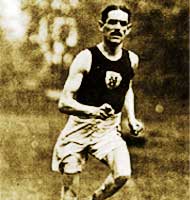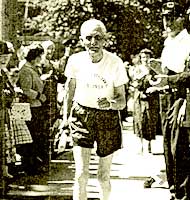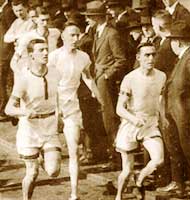ALFRED Shrubb was small, wiry and rank like a demon. In his first big race, in 1900, astonished onlookers labelled him ‘The Little Wonder’ – a nickname the press latched on to and which stuck. Within a few years Shrubb’s fame had spread worldwide and he laid claim to being athletics’ first international superstar.
Shrubb was a quiet, working class lad from the rural south of England. His hitherto unknown talent for distance-running was discovered one moonlit night, when in his working boots, he raced a horse-drawn fire tender to the scene of a farm fire three miles fromhis home. The captain of the local athletics club saw this and immediately invited him to join them. Within a short time Shrubb had become local, then national and then international champion, and was soon amassing titles, trophies and world records. Some of his best times remained unbeaten for almost half a century.
His adventures around the world make him unique among the top performers in sporting history. He thought nothing of running solo against entire teams of relay runners, for example, such was his need for opposition to test him. Banned for life for breaking amateurism’s strict code, he turned to professional racing in North America in 1906 and his subsequent exploits on the pro circuit beggared belief. In some cases his opponents were not even human!
In his heyday Shrubb was virtually unbeatable at all distances between 2,000 yards and 15 miles. He won more than 1,000 races and suffered only a handful of defeats – the latter usually coming at one mile or in marathons, distances he wasn’t best suited to.
He ended his ‘official’ career as an amateur with a stack of world records to his name. This was an era before IAAF ratification of records, and times were recorded for a wide range of distances that are no longer recognised in the modern world. Many of Shrubb’s records were not beaten for years – for example, his 3-mile world best set in London in May 1903 (14.17.6) was not beaten for 30 years – also in London – by one of the famous Flying Finns, Lauri Lehtinen. Some of his native British records lasted even longer.
But, despite his many track and road achievements, deep down Shrubb always preferred cross-country running. High-stepping across fields and through forests filled him with delight and he loved the sense of freedom and the chance to escape the discipline of being timed and having to lap a track monotonously. His first taste of running free had come as a teenage boy when he’d followed the local fox-hunt near his home. Little did he realise then that galloping across the fields and ditches would be perfect preparation for his later career – which would include victory at the first two International (World) Cross Country championships ever staged.
Shrubb received coaching from some of the top names of the era, but generally preferred to manage his own training and racing schedules and his astute planning and common sense attitude led to him becoming quite an expert. He would write two training manuals, published around 1908, which are still spoken of in reverential terms by aficionados 100 years later.


